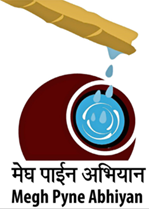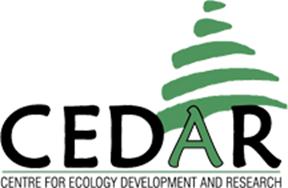 Megh Pyne Abhiyan (“Cloud Water Campaign”), a Public Charitable Trust is based on the belief that every individual has a right to lead life with ‘dignity and determination’. The Trust is committed towards behavioural change amongst the rural communities to effectively revive, innovate and institutionalize water and sanitation management practices and mainstream issues concerning flood, drought, and groundwater management, through collective accountability and action. MPA works through a network of grassroots organizations, social development professionals and resource institutions/individuals in north Bihar (Supaul, Saharsa, Khagaria, Madhubani, and Pashchim Champaran) and Jharkhand (Dhanbad).
Megh Pyne Abhiyan (“Cloud Water Campaign”), a Public Charitable Trust is based on the belief that every individual has a right to lead life with ‘dignity and determination’. The Trust is committed towards behavioural change amongst the rural communities to effectively revive, innovate and institutionalize water and sanitation management practices and mainstream issues concerning flood, drought, and groundwater management, through collective accountability and action. MPA works through a network of grassroots organizations, social development professionals and resource institutions/individuals in north Bihar (Supaul, Saharsa, Khagaria, Madhubani, and Pashchim Champaran) and Jharkhand (Dhanbad).More..
 The Centre for Ecology, Development and Research (CEDAR) was established in January 2006 by a group of academics and development professionals with the aim to work on issues pertaining to environment, ecology and rural development in the mountain regions. Applied research and policy issues are of particular interest to CEDAR. In pursuance of its mandate, CEDAR aims to bridge information gap constricting field practitioners and decision makers in the field of environmental management. Towards this end, CEDAR proposes to develop as a field research and monitoring agency with an arm dedicated to supporting NGOs and building their capacity in the relevant areas. The research activities of the Centre essentially focus on generating and interpreting socio-ecological field-data that can improve the management of natural resources. Central to CEDAR’s ideology is the recognition that local communities must participate in the conservation of their habitat. Therefore, in addition to core research in forestry, ecology and social sciences, often in collaboration with Universities and research institutions, CEDAR also works towards strengthening links between communities and ecosystems by networking with grass-root organisations. Cedar sees itself as being a platform to carry out research work of relevance to people and their environment. We aim to get together a mix of researchers, development professionals, and visionaries to identify areas where gaps in information and knowledge exist. These gaps may then be filled by in-house resources, and by collaborating with likeminded institutions and individuals. Cedar does not see itself as a research agency or a grassroots intervention agency but, instead, as an agency with an ability to work closely with both. Cedar currently focuses on the Western and Central Himalayan regions of India. More..
The Centre for Ecology, Development and Research (CEDAR) was established in January 2006 by a group of academics and development professionals with the aim to work on issues pertaining to environment, ecology and rural development in the mountain regions. Applied research and policy issues are of particular interest to CEDAR. In pursuance of its mandate, CEDAR aims to bridge information gap constricting field practitioners and decision makers in the field of environmental management. Towards this end, CEDAR proposes to develop as a field research and monitoring agency with an arm dedicated to supporting NGOs and building their capacity in the relevant areas. The research activities of the Centre essentially focus on generating and interpreting socio-ecological field-data that can improve the management of natural resources. Central to CEDAR’s ideology is the recognition that local communities must participate in the conservation of their habitat. Therefore, in addition to core research in forestry, ecology and social sciences, often in collaboration with Universities and research institutions, CEDAR also works towards strengthening links between communities and ecosystems by networking with grass-root organisations. Cedar sees itself as being a platform to carry out research work of relevance to people and their environment. We aim to get together a mix of researchers, development professionals, and visionaries to identify areas where gaps in information and knowledge exist. These gaps may then be filled by in-house resources, and by collaborating with likeminded institutions and individuals. Cedar does not see itself as a research agency or a grassroots intervention agency but, instead, as an agency with an ability to work closely with both. Cedar currently focuses on the Western and Central Himalayan regions of India. More..
 The Mountain Institute lndia is registered as a charitable trust in New Delhi. The Mountain Institute entered in Sikkim way back in 1996 which was later on registered as TMI lndia in 2006. lt is a part of the TMI that is committed to work to conserve the world’s high priority mountain ecosystems, improve the livelihoods of mountain people, and increase awareness for mountain issues through research, advocacy, education, and outreach. Currently, it is involved in community-based conservation programs in the Eastern Himalayan region, partnering with local people to strengthen their communities and to conserve natural resources and cultural heritage. TMI India has conceived three broad programmes viz., (1) Ecosystem services, (2) Biodiversity and Environmental Change, and (3) Livelihoods of Mountain Communities and their Cultures. The long term vision of the TMI lndia is to ensure the sustainable future of India’s mountains and people by conserving high priority mountain ecosystems, increasing environmentally and culturally sustainable livelihoods for mountain communities, and promoting support for mountain culture. As a mountain based organization, TMI lndia seeks to develop and provide innovative solutions, in cooperation with a numerous regional and international partners, national and local partners, which foster action and change for overcoming mountain people’s economic, social and physical vulnerability. More..
The Mountain Institute lndia is registered as a charitable trust in New Delhi. The Mountain Institute entered in Sikkim way back in 1996 which was later on registered as TMI lndia in 2006. lt is a part of the TMI that is committed to work to conserve the world’s high priority mountain ecosystems, improve the livelihoods of mountain people, and increase awareness for mountain issues through research, advocacy, education, and outreach. Currently, it is involved in community-based conservation programs in the Eastern Himalayan region, partnering with local people to strengthen their communities and to conserve natural resources and cultural heritage. TMI India has conceived three broad programmes viz., (1) Ecosystem services, (2) Biodiversity and Environmental Change, and (3) Livelihoods of Mountain Communities and their Cultures. The long term vision of the TMI lndia is to ensure the sustainable future of India’s mountains and people by conserving high priority mountain ecosystems, increasing environmentally and culturally sustainable livelihoods for mountain communities, and promoting support for mountain culture. As a mountain based organization, TMI lndia seeks to develop and provide innovative solutions, in cooperation with a numerous regional and international partners, national and local partners, which foster action and change for overcoming mountain people’s economic, social and physical vulnerability. More..
 Practical Action, established in 1966 by an Economist Dr E. F. Schumacher, has its head office in the UK and regional and country offices in Bangladesh, Kenya, Nepal, Peru, Sri Lanka. Sudan and Zimbabwe which were established with an objective of reducing poverty through the wider use of appropriate technologies in the development world. Practical Action started its work in Nepal in 1979 and established its country office in Nepal in 1998. Practical Action Programme in Nepal was directed to its programmatic areas such as (i) access to energy, (ii) agriculture, and food security (iii) urban water, waste and sanitation, and (iv) disaster risk reduction. Furthermore, climate change and markets has been identified to be cross-cutting through all of these programmatic sectors.
Practical Action, established in 1966 by an Economist Dr E. F. Schumacher, has its head office in the UK and regional and country offices in Bangladesh, Kenya, Nepal, Peru, Sri Lanka. Sudan and Zimbabwe which were established with an objective of reducing poverty through the wider use of appropriate technologies in the development world. Practical Action started its work in Nepal in 1979 and established its country office in Nepal in 1998. Practical Action Programme in Nepal was directed to its programmatic areas such as (i) access to energy, (ii) agriculture, and food security (iii) urban water, waste and sanitation, and (iv) disaster risk reduction. Furthermore, climate change and markets has been identified to be cross-cutting through all of these programmatic sectors.
Practical Action’s head office in Nepal is in Kathmandu, and regional offices are in Chitwan, Nepalgunj, and Banke, and field offices in Doti.More..
 LEAD Pakistan was established in 1995 as a non-profit organisation under the Societies Registration Act XXI, 1880. Since then, it has grown into one of the most dynamic member programmes in the world with a fully equipped office in Islamabad, Pakistan. Lead’s Flagship Leadership Development Programme (LDP) was started in 1996 which is an innovative capacity building initiative designed with the purpose of providing knowledge, awareness, skills, exposure and linkages to leaders of tomorrow to integrate sustainable development concerns with their professional work. Till date, a strong community of more than 200 LEAD fellows is making the difference at national and international levels. Lead Pakistan started project implementation at the grassroots level in 2004.
LEAD Pakistan was established in 1995 as a non-profit organisation under the Societies Registration Act XXI, 1880. Since then, it has grown into one of the most dynamic member programmes in the world with a fully equipped office in Islamabad, Pakistan. Lead’s Flagship Leadership Development Programme (LDP) was started in 1996 which is an innovative capacity building initiative designed with the purpose of providing knowledge, awareness, skills, exposure and linkages to leaders of tomorrow to integrate sustainable development concerns with their professional work. Till date, a strong community of more than 200 LEAD fellows is making the difference at national and international levels. Lead Pakistan started project implementation at the grassroots level in 2004.
The main focus initially was to leverage its strength in capacity building and training to bring about a meaningful change at institutional and community levels. For implementation and sustainability of development interventions, networks of organizations were formed. Research was carried out and disseminated to inform the stakeholders and increase the impact of interventions. LEAD Pakistan has continued to build its portfolio by planning and delivering interventions in different development areas and sectors especially education, health, livelihood, food & agriculture, environment, forestry, water, energy, water and climate change. etc. The organisation has successfully developed and delivered more than 180 development initiatives with the total financial outlay of more than 25 million dollars.
Currently, LEAD is positioning itself as a think tank and is increasingly incorporating learning, knowledge management and public policy engagement activities in the design and implementation of projects. The policy level interventions are meant to enrich the development vision of the Pakistan government through evidence-based research, and the sensitization of policy and law makers to emerging development needs. More..
